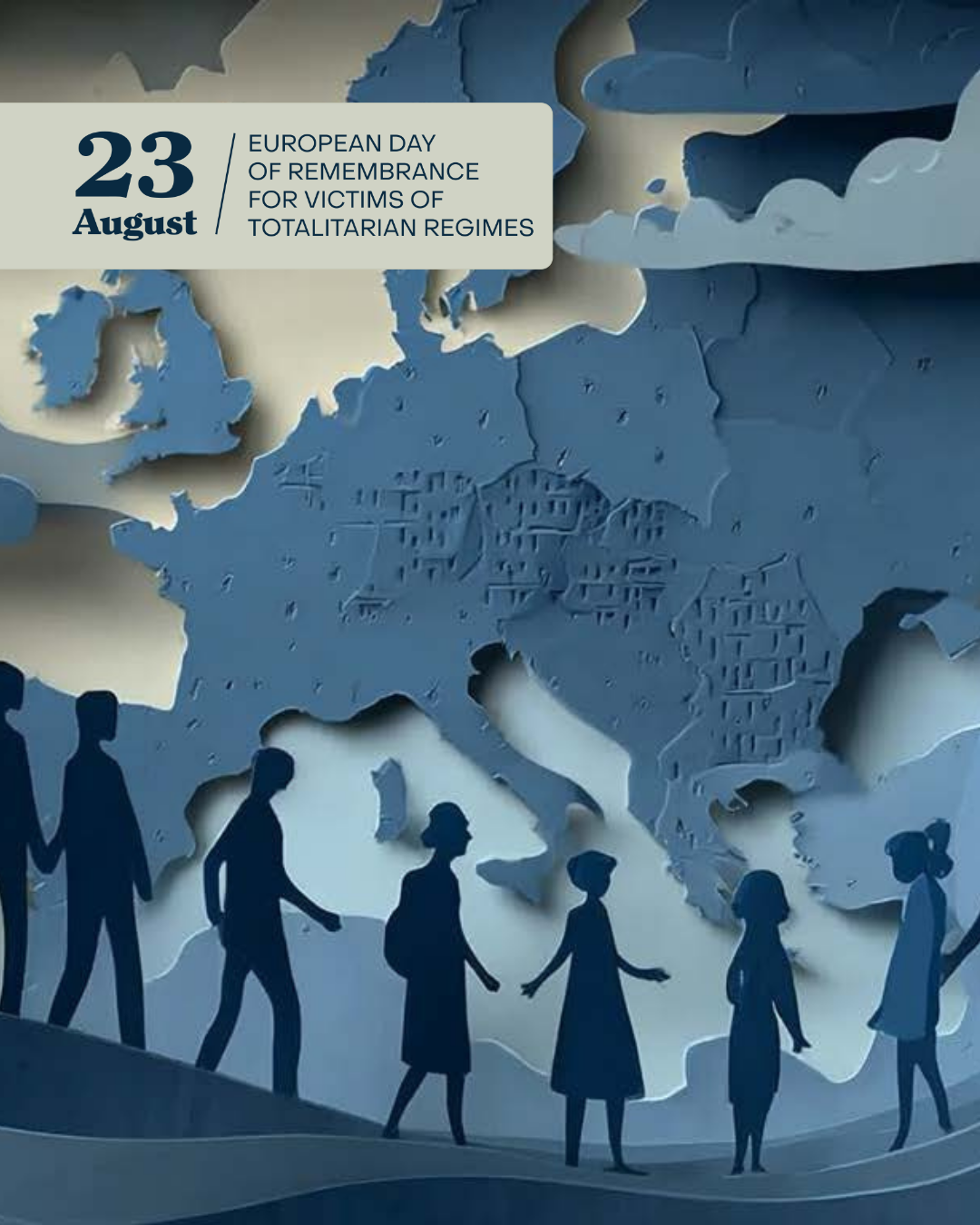In 2025, the European Network Remembrance and Solidarity (ENRS) continues its annual ‘Remember. August 23’ campaign, focusing on intergenerational trauma and the long-term effects of totalitarian violence. Under the theme “The Wounds Can Be Healed”, this year’s initiative examines how trauma is not only experienced by direct victims but also transmitted through families and communities across generations.
ENRS Director Rafał Rogulski explains:
“Even if we were not direct victims of totalitarian regimes, we absorbed the reality of a captive state. Trauma experienced by part of a surviving family often permeates entire generations—even those born after 1989. But today, with the intellectual and educational freedom of democratic societies, we have a chance to learn from these experiences and begin to heal.”
Throughout August, the programme will feature interviews, educational materials, films, and expert articles illustrating how unspoken fears, silence, and emotional wounds can persist decades after the fall of a totalitarian regime. The theme is introduced in the short film “The Wounds Can Be Healed”. Opening this year’s campaign is Dr Yael Danieli, a pioneering victimologist, whose articles “Necessary Elements of Healing after Massive Traumatisation” and “Some Principles of Self-Healing” draw on four decades of experience addressing the enduring legacies of mass trauma. The expert interviews are accompanied by a comprehensive brochure explaining what intergenerational trauma is, how to recognise it, and how to address it.
This year’s edition also concludes #WWII80YearsAfter, ENRS’s year-long international educational project marking the 80th anniversary of the end of the Second World War. More on this initiative can be found at enrs.eu/WWII.
About the Campaign
‘Remember. August 23’ takes place annually on the European Day of Remembrance for Victims of Totalitarian Regimes, established by the European Parliament to commemorate the Molotov–Ribbentrop Pact, signed on 23 August 1939. This agreement between Nazi Germany and the Soviet Union paved the way for the outbreak of the Second World War and decades of systemic violence and repression.
Each year, ENRS uses this symbolic date to honour the victims, confront the legacies of authoritarian rule, and raise public awareness of how those legacies continue to shape contemporary society. The observance encourages people across Europe to reflect on the past, share stories, and consider the emotional and historical burdens inherited from totalitarian regimes.
The international media campaign is accompanied by a pin bearing the inscription ‘Remember. August 23’, a symbolic sign of remembrance encouraging politicians, journalists, artists, social activists and young people from all over Europe to discuss the World War II and its aftermath every year. The pins are distributed in museums and memorial sites across Europe and are also available at the ENRS’s headquarters at 37 Zielna Street in Warsaw. See the list of selected locations that have joined the campaign.
In previous years, the ENRS presented fates of:
— Emílie Machálková (1926–2017), a Czech woman of Roma origin, Holocaust survivor and promoter of Roma culture,
— Johann Trollmann (1907–1944), a German boxer of Roma origin, a victim of Nazi persecution, murdered by a prison guard whom he had previously defeated in the ring,
— Władysław Bartoszewski (1922–2015), Polish social activist, historian and politician, Auschwitz concentration camp prisoner, Home Army soldier, imprisoned several times by the communist authorities,
— Boris Romanchenko (1926–2022), Ukrainian activist, Holocaust survivor, victim of Russian aggression against Ukraine,
— Doina Cornea (1929–2018), a Romanian dissident who had the courage to publicly oppose the bloody rule of communist dictator Nicolae Ceausescu in the 1980s,
— Ieva Lase (1916–2002), a Latvian translator and French teacher who was twice imprisoned for her dissident activities,
— Jaan Kross (1920–2007), Estonian poet and writer, arrested during the German occupation of Estonia and later imprisoned by the NKVD and sent to the gulags,
— Kazimierz Moczarski (1907–1975), Polish journalist, writer, Home Army soldier and author of ‘Conversations with an Executioner’,
— Milada Horáková (1901–1950), Czech politician, sentenced to death during the Stalinist period in Czechoslovakia,
— Juliana Zarchi a Lithuanian of German-Jewish origin who experienced both totalitarianisms,
— Mala Zimetbaum, a Jew, and Edek Galiński, a Pole, prisoners in the Auschwitz concentration camp,
— Péter Mansfeld, the youngest victim of the 1956 Hungarian repression.
As part of the commemoration, we feature the text "The Day Europe Opened Pandora’s Box" by Professor Jan Rydel explaining the far-reaching consequences of the events of August 1939, as well as a guide with useful information about the 23 August commemorations.
How can you join the ‘Remember. August 23’ campaign?
The ENRS has prepared a special commemoration guide presenting several ways to commemorate the European Day of Remembrance for Victims of Totalitarian Regimes.
• The simplest one is to wear a pin and share this gesture of remembrance online.
• Post a photo of yourself with the ENRS pin and let others know what this day means to you, use the hashtags: #RememberAugust23, #ENRS.
• Watch the individual stories of those, who experienced totalitarian violence in different European countries.
• Read the Stefan Troebst’s piece on the Genesis of Euro Atlantic Day of Remembrance and learn Why should we remember August 23, 1939 from Roger Moorhouse’s article.
• Study our free resources on available on our platform Hi-story Lessons.
• Visit a museum or memorial dedicated to the victims of totalitarian regimes and share your reflections.
• Commemorate with others and don’t be indifferent.
